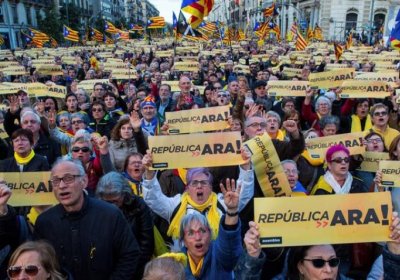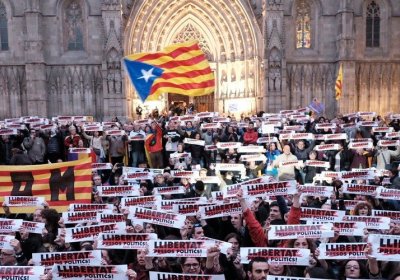In recent weeks, senior judges in the loftiest halls of the Spanish legal system — the Supreme Court, the National High Court and the Constitutional Court — have been exposed as subverters of a fair legal process, lackeys of Spain’s almighty banking elite and bumbling incompetents, writes Dick Nichols from Barcelona.
Barcelona
Last December 21, Catalonia’s three parliamentary forces supporting independence — Together for Catalonia (JxCat), the Republican Left of Catalonia (ERC) and Popular Unity Candidacy (CUP) — won a 70-65 seat majority in the 135-seat Catalan parliament.
Six months of drawn-out negotiations over forming a pro-independence government then followed.
At the June 8 ceremonial handing over of portfolio briefcases from outgoing conservative People’s Party (PP) ministers to their incoming Spanish Socialist Workers’ Party (PSOE) replacements, the contrasts were dramatic.
A bunch of reactionary lifetime political operators and religious obscurantists were replaced by what new Prime Minister Pedro Sánchez boasted was the “progressive”, “feminist” and “Europeanist” alternative.
The Catalan parliament finally voted in a new president on May 14, 199 days after the pro-independence bloc held on to its majority at the December 21 elections imposed by the Spanish government.
Basque Homeland and Freedom (ETA), which waged a decades-long military campaign for Basque independence, released its “Statement to the Basque Country: declaration on harm caused” on April 8. The statement is an apology for the suffering arising from more than 40 years of violent operations that ended in a permanent ceasefire in 2011.
“General strike! General strike! General strike!” In protests across Catalonia after the March 23 jailing of five MPs and the March 25 detention in Germany of Catalan President Carles Puigdemont, these words rang out loud and appeared on placards and banners everywhere.
A general strike would certainly make the Spanish government of Prime Minister Mariano Rajoy and the senior judges doing its bidding think twice about their relentless persecution of Catalonia’s pro-independence MPs.
Except that a general strike, while desirable and important as a goal, will not happen until there is an earthquake in the Catalan trade union movement.
After the December 21 Catalan election reconfirmed a majority for pro-independence forces, it seemed inevitable a new government would soon be formed. More than two months later, however, the spectre of a repeat election haunts Catalonia.
The main war aim of the People’s Party (PP) government of Spanish Prime Minister Mariano Rajoy for the December 21 Catalan elections was to stop the re-election of a pro-independence government.
During the election campaign, the Spanish political, economic and media establishment even dreamed of the election of a pro-unionist administration on the back of unprecedented participation from a «silent majority» supposedly in favour of continuing the tie with Spain.
At first glance, the result of the December 21 Catalan parliamentary election changed little.
All three competing blocs in the intensely polarised December 21 Catalan election are working feverishly to win in a battle shaped by Spanish Prime Minister Mariano Rajoy’s October 27 sacking of the Catalan government.
Road and rail blockades organised by the Committees in Defence of the Republic (CDR) paralysed traffic movement across Catalonia on November 8.
The blockades were part of a day of protest action aimed against the Spanish government’s takeover of the Catalan government and parliament, and the detention of eight Catalan government ministers.
Judge Carmen Lamela of Spain’s National High Court — direct descendant of the fascist Franco-era Court of Public Order — took the war of the Spanish state against the Catalan pro-independence government to a new level of judicial violence on November 2.
- Previous page
- Page 6
- Next page










